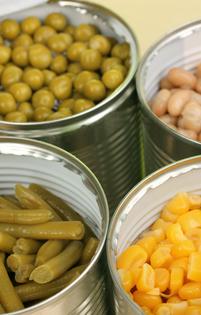Get Healthy With...Canned Foods?
Canned foods -- fruits, vegetables and beans -- are the ultimate convenience foods; they're nutritious, available year-round and economical. Yet, surveys show they are misunderstood and not considered healthful choices.
Historically, canning was developed to preserve summer's bounty and extend food availability all year long to prevent seasonal starvation. Canned foods contain the same important nutrients -- sometimes even more -- as fresh foods, and they can help you fit more fruits, vegetables and seafood into your diet at a lower cost.
Many consumers desire fresh over canned foods, but it doesn't always make nutritional -- or seasonal -- sense. "Fresh produce can lose lots of nutrients, especially during the winter when it travels hundreds or thousands of miles to get to your grocer, where it then sits on the shelf until you buy it," said registered dietician Elizabeth Ward, author of "My Plate for Moms." She continued, "Fresh, local produce is impossible to come by in many parts of the country during winter, so relying on canned foods is a practical solution to have nutritious products year-round."
Some fresh vegetables, such as spinach and green beans, lose up to 75 percent of their vitamin C within seven days of harvest. Yet canned fruits and vegetables are packed at peak ripeness to deliver the same consistent taste year round. The canning process locks in nutrients when the food is at its ultimate freshness. Further, canned foods are environmentally friendly because the metal used in containers is the most recycled material in the U.S.
A 2012 study published in the Journal of Nutrition & Food Sciences showed that canned fruits and vegetables provide important essential nutrients, like vitamin C, often at a lower cost per nutrient than fresh, frozen or dried forms. And a study that analyzed data from the National Health and Nutrition Examination Survey found that including canned fruits and vegetables in children's diets improved overall diet quality. "Children who ate canned fruits and vegetables ate 22 percent more vegetables, 14 percent more fruit, and had better diet quality and increased nutrient intake," said study co-author Marjorie Freedman, PhD.
Some nutrients are even higher in canned foods. Lycopene, the antioxidant in tomatoes, increases in bioavailability when heated, making it more potent in canned tomatoes than in fresh tomatoes. Canned pumpkin has less water than fresh, thereby increasing the concentration of vitamin A.
Salt/sugar a concern? While canned foods can be high in sodium, the leading sources of sodium in the American diet are not from canned foods (nor are canned fruits among the top sources of added sugar), according to USDA data. You can avoid extra sodium and sugar in canned foods by choosing those labeled "no-salt" and "no-sugar added." Rinsing also can help reduce salt and sugar significantly.
Canned foods are the perfect addition to your favorite casseroles, soups and salads. Not only do they help provide seasonal fruits and vegetables for pennies on the dollar, but using canned foods saves preparation time by skipping the cleaning, chopping and cooking. Ward believes using canned vegetables -- especially vegetables that are timely to prepare, such as artichokes -- can simplify cooking, noting, "I probably wouldn't eat artichokes if they weren't cleaned and cut up in a can."
(Environmental Nutrition is the award-winning independent newsletter written by nutrition experts dedicated to providing readers up-to-date, accurate information about health and nutrition in clear, concise English. For more information, visit www.environmentalnutrition.com.)







